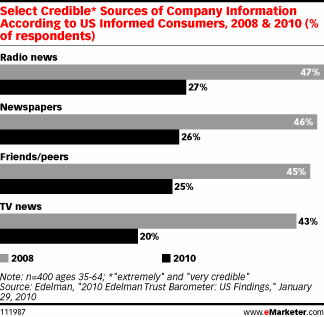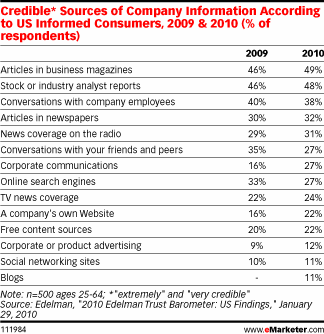It’s amazing how research jumps all over the place, one minute social networks are the savior of marketers trying to get word of mouth referrals via social networks and the next thing, new research comes out that throws that process into doubt, so who do you believe? Earlier this month, Ad Age published some remarkable statistics from Edelman: just one-quarter of consumers “view their friends and peers as credible sources of information about a company,” a number that has dropped by nearly one-half since 2008. While trust in newspapers and radio was also down, it remained higher than faith in peers.
As Ad Age noted, the Edelman figures could have major implications for social media marketing:
If consumers stop believing what their friends and the “average Joes” appearing in testimonials say about a product or company, the implications could be significant not just for marketers but for the social networks and word-of-mouth platforms selling themselves as solutions to communicating in a jaded world. The influence of peers has been considered the leading rationale for brands’ shifting marketing dollars to social media.
The importance of peer influence is backed up by several studies that don’t seem to jibe with the Edelman data. Nielsen found last spring that almost everyone trusted people they knew. Moms overwhelmingly trust others like them more than experts, according to EXPO. And Lightspeed Research reported that family members and close friends were the most trusted source of information when making purchase decisions. The list could go on.
Based on an analysis of the Edelman survey, two methodological factors appear to be in play. First, where many pollsters ask questions such as “Who do you trust for advice about a product or service?” in this case respondents were asked about “credible” sources of information “about a company”—not about a product or a brand. Some of the suggested answers, for example, “stock or industry analyst reports” and “articles in business magazines,” could also put respondents in a more business-oriented mindset.
The second factor is the survey base. Edelman conducted its survey among college-educated consumers ages 25 to 64 who are in the top 25% of household income relative to age group in their home country and who “report significant media consumption and engagement in business news and public policy.” The opinions of such an affluent, highly educated, highly informed group cannot be extended to the general population.
“High-income, highly educated people have access to more sources of information, so they may be more likely to review and consider many viewpoints before deciding what they believe would be credible,” said eMarketer senior analyst Debra Aho Williamson. “I don’t think word-of-mouth is any less relevant to these individuals. Instead, it is one of many ingredients in the mix.”
Richard Edelman, president and CEO of Edelman, hinted as much when he told Ad Age, “People have to see messages in different places and from different people. That means experts as well as peers or company employees.” And certainly, at least this select group of consumers appears to have become somewhat jaded over the past few years, with trust levels dropping in many categories, not just word-of-mouth.


























Leave a Comment